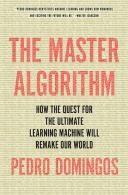Книга: The Master Algorithm: How the Quest for the Ultimate Learning Machine Will Remake Our World
A society of models
A society of models
In this rapidly approaching future, you’re not going to be the only one with a “digital half” doing your bidding twenty-four hours a day. Everyone will have a detailed model of him- or herself, and these models will talk to each other all the time. If you’re looking for a job and company X is looking to hire, its model will interview your model. It will be a lot like a real, flesh-and-blood interview-your model will still be well advised to not volunteer negative information about you, and so on-but it will take only a fraction of a second. You’ll click on “Find Job” in your future LinkedIn account, and you’ll immediately interview for every job in the universe that remotely fits your parameters (profession, location, pay, etc.). LinkedIn will respond on the spot with a ranked list of the best prospects, and out of those, you’ll pick the first company that you want to have a chat with. Same with dating: your model will go on millions of dates so you don’t have to, and come Saturday, you’ll meet your top prospects at an OkCupid-organized party, knowing that you’re also one of their top prospects-and knowing, of course, that their other top prospects are also in the room. It’s sure to be an interesting night.
In the world of the Master Algorithm, “my people will call your people” becomes “my program will call your program.” Everyone has an entourage of bots, smoothing his or her way through the world. Deals get pitched, terms negotiated, arrangements made, all before you lift a finger. Today, drug companies target your doctor, because he decides what drugs to prescribe to you. Tomorrow, the purveyors of every product and service you use, or might use, will target your model, because your model will screen them for you. Their bots’ job is to get your bot to buy. Your bot’s job is to see through their claims, just as you see through TV commercials, but at a much finer level of detail, one that you’d never have the time or patience for. Before you buy a car, the digital you will go over every one of its specs, discuss them with the manufacturer, and study everything anyone in the world has said about that car and its alternatives. Your digital half will be like power steering for your life: it goes where you want to go but with less effort from you. This does not mean that you’ll end up in a “filter bubble,” seeing only what you reliably like, with no room for the unexpected; the digital you knows better than that. Part of its brief is to leave some things open to chance, to expose you to new experiences, and to look for serendipity.
Even more interesting, the process doesn’t end when you find a car, a house, a doctor, a date, or a job. Your digital half is continually learning from its experiences, just as you would. It figures out what works and doesn’t, whether it’s in job interviews, dating, or real-estate hunting. It learns about the people and organizations it interacts with on your behalf and then (even more important) from your real-world interactions with them. It predicted Alice would be a great date for you, but you had an awkward time, so it hypothesizes possible reasons, which it will test on your next round of dating. It shares its most important findings with you. (“You believe you like X, but in reality you tend to go for Y.”) Comparing your experiences of various hotels with their reviews on TripAdvisor, it figures out what the really telling tidbits are and looks for them in the future. It learns not just which online merchants are more trustworthy but how to decode what the less trustworthy ones say. Your digital half has a model of the world: not just of the world in general but of the world as it relates to you. At the same time, of course, everyone else also has a continually evolving model of his or her world. Every party to an interaction learns from it and applies what it’s learned to its next interactions. You have your model of every person and organization you interact with, and they each have their model of you. As the models improve, their interactions become more and more like the ones you would have in the real world-except millions of times faster and in silicon. Tomorrow’s cyberspace will be a vast parallel world that selects only the most promising things to try out in the real one. It will be like a new, global subconscious, the collective id of the human race.
- 17.2.2. Preemption Models
- 4.2. SYSTEM MODELS
- 4.3.1. Allocation Models
- 6.3. CONSISTENCY MODELS
- 6.3.8. Summary of Consistency Models
- 16.3.1 Resource Request Models
- DirectX Tutorial 10: Loading Complex Models
- Папка Models
- Глава 2 Табличный редактор Microsoft Excel
- Build a Run-Time Image for an OS Design




